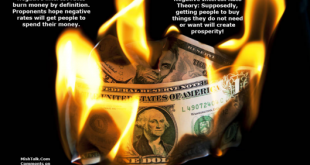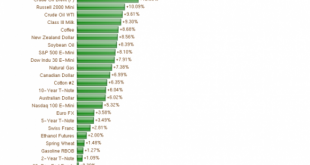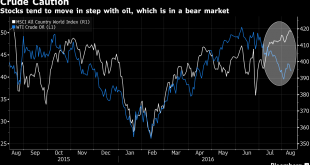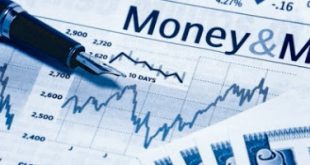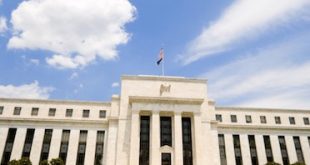Swiss Franc The last ECB meeting and Dragh’s hawkish comments is for us the main reason of the euro strength, this despite stronger Swiss GDP growth. We see a mismatch between the weak ISM Non-Manufacturing PMI and the St. Louis and Atlanta Fed GDP trackers. Click to enlarge. Federal Reserve Our approach to Fed-watching is clear: Among the cacophony of voices, the Troika of Fed leadership, Yellen, Fischer and...
Read More »Case For -2 percent Rates, Banning Cash? Jim Grant Blasts Lunatic Proposals
Submitted by Michael Shedlock via KMichTalk.com, Looking for group think, extrapolation of extreme silliness, linear thinking, and belief in absurd models? Then look no further than Fed presidents, their advisors, and academia loaded charlatan professors. Today’s spotlight is on Marvin Goodfriend, a former economist and policy advisor at the Federal Reserve’s Bank of Richmond, and Ken Rogoff, a chaired Harvard...
Read More »Swiss stocks fluctuate as central bank decisions dominate the landscape
SMI The Swiss Market Index, along with other European markets, fluctuated this week as central bank decisions dominated the landscape. Click to enlarge. Economic Data Equity markets advanced at the beginning of the week as chances of the Federal Reserve raising US interest rates later this month declined after a surprisingly weak report on the US service-sector earlier this week. The report followed data last week...
Read More »Should the Fed Reduce the Size of its Balance Sheet?
On his blog, Ben Bernanke discusses the merits of the Fed’s strategy to slowly reduce the size of its balance sheet to pre crisis levels. Bernanke suggests that this strategy should be reconsidered: First, the large balance sheet provides lots of safe and liquid assets for financial markets. This might strengthen financial stability. (DN: In my view, there are also reasons to expect the opposite.) Second, a larger balance sheet can help improve the workings of the monetary transmission...
Read More »Gold Wins In Three Out Of Four Scenarios, Macquarie Warns “None Of Them Are Good For The Economy”
Submitted by Valentin Schmid via The Epoch Times, Warren Buffett claims that gold is worthless because it doesn’t produce anything. Fair point, but what if the other sectors of the economy also stop producing? “If you think of gold, the only way gold loses is if normal business and private sector cycles come back. If that is the case, gold goes back 100 dollars per ounce. The other outcomes, deflation, stagflation, hyperinflation are good for gold,” said Viktor Shvets,...
Read More »US Futures Rebound, European Stocks Higher As Oil Rises
The summer doldrums continue with another listless overnight session, not helpd by Japan markets which are closed for holiday, as Asian stocks fell fractionally, while European stocks rebounded as oil trimmed losses after the the IEA said pent-up demand would absorb record crude output (something they have said every single month). S&P futures have wiped out almost all of yesterday's losses and were up over 0.2% in early trading. Europe's Stoxx 600 rose 0.4% with miners and energy...
Read More »Could the Fed have Rescued Lehman Brothers?
In a paper, Larry Ball argues that inadequate collateral and lack of legal authority were not the reasons that the Fed let Lehman fail. … … the primary decision maker was Treasury Secretary Henry Paulson–even though he had no legal authority over the Fed’s lending decisions. … evidence supports the common theory that Paulson was influenced by the strong political opposition to financial rescues. … Another factor is that both Paulson and Fed officials, although worried about the effects of...
Read More »Effective Fed Funds and Money Markets
Summary: Fed funds have been trading firmly. There are several reasons and one of them is the shift that is taking place in the US money markets. Still the risk of a Fed hike has increased, just as speculation increases of easing in other major centers. The weighted average of the Fed funds rate has edged higher. Following the Fed hike in December 2015, the Fed funds average around 36 bp in January before...
Read More »A Longer Wait for the Fed
The Federal Reserve is expected to keep monetary policy unchanged over the next few months as the central bank continues to assess the underlying strength of the U.S. economy, especially after the Brexit vote raised concerns that a potential slowdown in the U.K. economy could have a significant spillover effect globally. Credit Suisse’s Global Markets team believes that the vote has, in fact, exacerbated some tendencies within the Fed that were in place long before Britain’s June 23...
Read More »The Curious Case of Vanishing Lady Liberty; Only Gold and Silver Remember Her
The very first word anyone ever saw on a circulating United States coin was the word “LIBERTY.” From half-cents to silver dollars, each featured the likeness of an unnamed woman. The images varied, thanks to different engravers, but together they became recognized as Lady Liberty. Many, maybe most, of young America’s citizens were illiterate. “Liberty” may have been the first word they ever learned to read. If not,...
Read More » Swiss Economicblogs.org
Swiss Economicblogs.org


